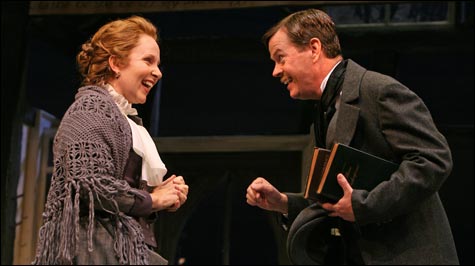
THE CORN IS GREEN: No Bette Davis, Kate Burton anchors a somewhat indifferent show.
|
The Williamstown Theatre Festival revival of Emlyn Williams’s
THE CORN IS GREEN
(through August 12) marks the first time this play has been trotted out in years, though it used to be a warhorse. Ethel Barrymore made it famous on stage in 1940, Bette Davis starred in the movie in 1945, and a 1979 TV movie featured Katharine Hepburn; there was even a (failed) attempt at a musical adaptation. The construction is workmanlike but effective. The protagonist is Miss Moffat, a feisty, feminist English spinster who inherits a house in a Wales mining town in the late 19th century and decides to turn it into a school to educate the local youth, many of whom are illiterate. But to her astonishment, she discovers that one of the boys, Morgan Evans, is prodigiously gifted. So she sets about tutoring him. Her aim is to turn him away from the miner’s life (he lost his father and brothers when one of the mines collapsed during his childhood, yet he has never considered any other future for himself) and possibly secure him a scholarship to Oxford.
The struggle to achieve an education despite debilitating obstacles is a particularly appealing dramatic theme, and the plays and movies that seize on it, like Aparajito and Sounder and My Left Foot, are sometimes moving and memorable. The Corn Is Green shares with Aparajito, the centerpiece of Satyajit Ray’s great Apu Trilogy, the notion that an intellectual spark can show itself in the most unlikely places; its key metaphor, taken from the first essay Morgan writes for Miss Moffat, is a light in a mine. The Corn Is Green is no masterpiece, but emotional conviction can make it memorable; that’s what happened with the Bette Davis film version.
Nicholas Martin’s production at Williamstown isn’t bad; it has lovely designs — sets by James Noone, lighting by Frances Aronson, costumes by Jeff Mahshie — and most of the actors in stock supporting roles perform them with affection and humor. But it’s rather an indifferent show, built around an uninspired Miss Moffat. Kate Burton, a Williamstown stalwart (and a frequent collaborator with Martin), is a fine technician. I had no trouble believing her in the period or believing what the script tells us about her character — her indomitable spirit, her tart wit (often applied witheringly to those she considers to be fools), her devotion to her student. The only one of her scenes I didn’t buy was the one in which Miss Moffat flatters the dull, vain local squire in order to achieve his assistance in putting Morgan forth for the scholarship. (You can see how insincere she is from a mile away.) But there’s no current of genuine feeling underneath her Victorian reserve. I never sensed how much it means to her to lift Evans above his circumstances, or how she shifts from wanting to do it out of pride and personal achievement to wanting to do it out of selfless love for the boy himself.
Burton’s son, Morgan Ritchie, does a creditable job in the role of the boy, though he doesn’t manage the transition in the last act, when Evans begins to taste the promise of freedom that a first-rate education could afford him. It’s a tricky shift, because Williams didn’t actually write the boy’s revelation — it happens between scenes, so the actor has to figure out how to convince us that it’s happened and why. Among the ensemble, Becky Ann Baker as Miss Moffat’s cockney housekeeper, Mrs. Watty, Dylan Baker as the squire, and Rod McLachlan and Kathy McCafferty as Miss Moffat’s two colleagues, pressed into service as fellow teachers, acquit themselves well, and Ginnifer Goodwin (of TV’s Big Love) brings some sashaying personality to the worst role in the play, that of Mrs. Watty’s sluttish daughter. Bessie is a melodramatic device to provide Evans with one more — most insurmountable — obstacle to reaching Oxford and changing his life forever, and I wish Williams had resisted the temptation. There are enough reasons for a boy from a Welsh mining family to pull against the educated Englishwoman who wants him to turn his back on everything he’s ever known — and to do so in the hope of a prize whose value he can’t possibly understand. To throw a self-serving flirt in his way cheapens the drama.